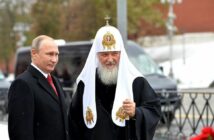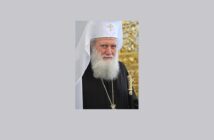Source: Public Orthodoxy
by Andrew Louth
The Christian world as a whole—and the Orthodox world, in particular—has been horrified by the invasion of Ukraine by the armed forces of Russia. It seems to be a distressingly indiscriminate campaign, in which thousands have been killed—young soldiers, men, women, and children—as well as hospitals, schools, homes, monasteries, churches destroyed, with millions of refugees fleeing from their homes and livelihoods. From the beginning, his Holiness, Patriarch Kirill, has spoken out in support of the military operation in Ukraine, using the same mealy-mouthed expression as President Putin to obscure the truth that a sovereign country has been invaded by its neighbor. This he seems to have done on his own initiative, for Putin shows no sign of interest in the support of the Church, but has rather sought to shackle the people of his own country by treating it as a criminal offence to call in question the actions of the Russian state. Nevertheless, insofar as any justification for the invasion of Ukraine has been offered, it has been in terms of the ideology of ‘Russian world’ (Russkiy Mir), which owes its origins to the initiative of Kirill (Gundyaev) in the years before he became patriarch, when, as Metropolitan of Smolensk, he established the World Russian Peoples Council, with its conservative and anti-Western agenda. Through its patriarch (our patriarch, for I speak as an archpriest of the Moscow Patriarchate), the Church of Russia has been thoroughly implicated in Putin’s invasion of Ukraine. Any voices of dissent, or even criticism, have been silenced throughout the Russian state (though it is noticeable that in the ‘diaspora’ there have been voices of dissent, even from senior hierarchs). This war has been going on for six months now, and despite protests and petitions from various quarters, the war continues relentlessly and news relating to the war has gone silent—or perhaps it would be better to use another metaphor—has gone dead. Putin’s policy seems to be (to adapt a remark of Tacitus’) to create a wilderness and call it…Russia!
The purpose of this essay is to introduce a letter from a group of concerned scholars on the state of affairs in Ukraine. Why should such group of scholars write such a letter to Dr Ioan Sauca, acting General Secretary of the World Council of Churches? A letter, asking him to persuade the WCC to exclude the Russian Orthodox Church (Moscow Patriarchate) from membership of the WCC, and at the forthcoming General Assembly in Karlsruhe to ensure the representation of both Orthodox Churches in Ukraine, and to seek some way of making possible attendance by members of the Russian Orthodox Church who have expressed criticism, even outrage, at the support being lent through Patriarch Kirill to Putin’s war? Dr. Sauca himself, on 2 March this year, barely a week after the invasion of Ukraine, called on Patriarch Kirill to ‘raise up [his]voice and speak on behalf of the suffering brothers and sisters’ in Ukraine; the patriarch’s response was simply to repeat the line taken by Putin. Why seek to exclude the Russian Orthodox Church from the World Council of Churches, given that such an action will be treated as another example of the Russophobia that he mentioned in his letter to Dr. Sauca?
In my view the plea is more in the nature of a cry of anguish—anguish at the enormity of the suffering that Russia’s invasion is causing. We do not, I think, deceive ourselves that the protest of a group of scholars and academics is likely to carry much weight in the world of geopolitics. Why should we care, some might comment—should we not simply go back to our books and our studies? The rapid uptake of this letter—which grew out of insights voiced by speakers at a conference on Religion and Politics in the Context of the War Against Ukraine organised by the Centre for Biblical Studies of the Babeș-Bolyai University, Cluj, Romania—bears witness to the genuinely international nature of the world of scholarship, consisting of communities, bound together by our common commitment to the search for truth, by dispassionate scholarship, out of which have grown strong bonds of friendship and concern for one another and all our fellow-scholars—indeed all our fellow human beings—throughout the world, including those gagged by oppressive measures intensified by the Russian State from the beginning of this war.
It is our hope that our cry of anguish will be heard, and others join their voice to this protest. Who knows how many Christians in Russia will find consolation, in the silence imposed on them, from their knowing that there are many voices being raised against the violence being perpetrated in Ukraine for, now, six months, violence aided and abetted by his Holiness Patriarch Kirill of Moscow and all the Rus′, whom many of us are finding it more and more difficult to acknowledge as our Father Patriarch?
Read the full text of the letter
Andrew Louth is Professor Emeritus at the University of Durham (UK) and Archpriest Emeritus of the Russian Orthodox Diocese of Sourozh (Moscow Patriarchate).
Public Orthodoxy seeks to promote conversation by providing a forum for diverse perspectives on contemporary issues related to Orthodox Christianity. The positions expressed in this essay are solely the author’s and do not necessarily represent the views of the editors or the Orthodox Christian Studies Center.




